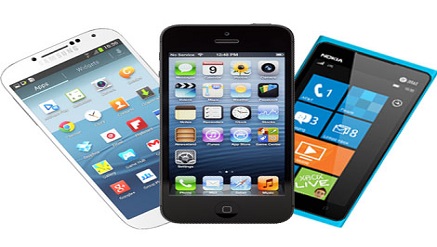Telecom
Smartphone Use Changing our Brain – Researchers

Typing text messages, scrolling web pages, and checking your email on your smartphone could be changing the way your thumbs and brain interacts. That’s according to researchers from the University of Zurich, ETH Zurich, and University of Fribourg.
Dr Arko Ghosh, of the University of Zurich and ETH Zurich, led the research which involved using electroencephalography (EEG) to measure the cortical brain activity in 37 right-handed people, 26 of whom were touchscreen Smartphone users and 11 users of old-fashioned cellphones.
A total of 62 electrodes were placed on an EEG cap worn by subjects to record how the brain processed touch from their thumb, forefinger and middle finger.
Brain activity was then compared with the individual commands recorded by each individuals’ phone logs.
“We measured people’s brain activity using a bunch of electrodes on the scalp and what these maps indicate is essentially how much of the variance between people we could explain by just looking at the phone logs, so how much brain activity can be explained by looking at people’s history of use on the phones alone,” said Ghosh.
Pointing at brain scans on his computer he added: “For instance these red spots here indicate when you measure the signals of these electrodes a lot of the differences between one person and the next can be explained simply by how much phone they were using in the previous ten days.”
Electrical activity in the brains of smartphone users was shown to be enhanced when all three fingertips were touched.
According to research student Magali Chytiris, activity in the cortex of the brain associated with the thumb and index fingertips was directly proportional to the intensity of phone use, as quantified by built-in battery logs.
“This activity is related to the amount of use from the past days of phone use,” said Chytiris. “So we used the logs, the battery logs, from the phone and we found that if the EEG recording was just after the peak of high intensive use then the brain activity was higher.”
Ghosh says the results suggest that repetitive movements over the touchscreen surface reshape sensory processing from the hand, with daily updates in the brain’s representation of the fingertips. He believes that cortical sensory processing in the contemporary brain is continuously shaped by personal digital technology.
“Most superficially what we found was that smartphone users have a brain that processes touch differently than people who don’t use smartscreen touch phones,” said Ghosh.
“However, if you dig a bit deeper into the data what you essentially see is that the most recent usage that people accumulated on their smartphones that reflected on the way that brains processed information from their fingertips. So essentially these day-to-day fluctuations that we encounter through our daily lives they imprint on the brain on the way that it processes information from your hands.”
Ghosh says that smartphone use is an ideal way to explore the everyday plasticity of the human brain. “It gives us a very good excuse to go back and look into the phone logs in greater detail to understand how our digital histories could be used to understand brain function and develop real world solutions by studying the real world example of brain plasticity,” he said.
Telecom
MTN Mulls Establishment of Fintech Firm in Nigeria, Others

MTN Uganda is seeking input from stakeholders on a plan to structurally separate its mobile money service, MoMo, from its core telecoms business.

According to the company, the proposed change will be discussed at the upcoming extraordinary general meeting on July 2.
If approved, the telco’s fintech business will be run by a new company controlled by MTN Group Fintech Holdings B.V. and a trust benefiting minority shareholders following a merger.
Additionally, the restructuring also aligns with MTN Group’s ambition 2025 strategy which aims to unlock value, attract new investors, and strengthen regulatory compliance by creating standalone fintech entities in Uganda, Ghana, and Nigeria.
The company’s fintech division has over 13 million customers, with an 18.4% revenue increase in the first quarter of 2025, driven by 19.0% growth in mobile money services, 19.8% growth in transaction volumes, and a 31.4% increase in transaction value.
Reports say the decision is part of the telco’s compliance with the National Payment Systems Act 2020, which mandates mobile money businesses to operate as standalone entities, and to align with MTN Group’s regional fintech strategy.
MTN Uganda, which is led by CEO Sylvia Mulinge, highlighted that the implementation of the proposed transaction will be subjected to a number of conditions and regulatory procedures.
“The implementation of the proposed transaction shall be subject to a number of conditions, including the company and MTN MoMo receiving all required regulatory approvals and no-objections and complying with any regulatory conditions,” said MTN Uganda in notice.
Telecom
Netflix Expands European Presence with €1 Billion Investment in Spain

Netflix has announced plans to invest more than €1 billion in Spanish film and television productions over the next four years, reinforcing its commitment to Spain as a key creative hub in Europe.

The announcement was made by co-chief executive Ted Sarandos at an event held at Netflix’s production studios near Madrid, celebrating the company’s 10-year presence in the country.
Sarandos emphasized that the investment would contribute significantly to Spain’s economy, create jobs, and enable the streaming platform to produce more local content. He was joined by Spanish Prime Minister Pedro Sánchez in unveiling the initiative.
Netflix first established its international production studios in Madrid in 2019, following the success of the Spanish-language hit series Money Heist.
Since then, its 22,000-square-meter facility has become one of Netflix’s major production centers within the European Union.
The company currently supports over 20,000 jobs in Spain, highlighting the nation’s growing influence in global entertainment.
The investment reflects Netflix’s ongoing strategy to expand its presence in European markets through original content and local talent.
Telecom
ngCERT Issues High Alert to Nigerians Using Android Phones

Nigeria Computer Emergency Response Team (ngCERT) has raised alarms over a new wave of advanced cyberattacks targeting Android mobile phones through a malware campaign dubbed Tria Stealer.

The malicious software is designed to infiltrate Android devices, hijack messaging accounts, intercept One-Time Passwords (OTPs), to steal sensitive personal and financial data.
According to ngCERT, Tria Stealer spreads primarily through deceptive tactics, such as fake event invitations distributed via popular messaging platforms like WhatsApp and Telegram.
Unsuspecting users are enticed to download an infected (APK) file, often disguised as a harmless system application, to evade detection.
Once installed, Tria Stealer requests extensive permissions, including access to SMS, call logs, and app notifications.
It immediately commences data harvesting activities, sending stolen information to a Command and Control (C2) server operated via Telegram bots.
This trojan spreads through fake links, usually disguised as wedding or event invites, and tricks users into downloading malicious APK files
“Account takeover of messaging platforms. Impersonation of victim for fraudulent money transfer requests. Compromise of banking and financial applications. Identity theft and credential harvesting.”
In plain terms, if your phone is compromised, the consequences could be catastrophic.
Your financial apps are vulnerable, your reputation could be ruined by impersonation and even simple personal messages could be twisted into tools for scams.
Here’s what users should be doing now:
Don’t download apps outside the official Play Store.
Be suspicious of random invites or links, even from people you know.
Turn on 2FA for everything—banking, emails, social platforms.
Get a reputable antivirus and keep it updated.
If you run an organisation, you should already be taking this seriously.
ngCERT’s guidance says you should raise awareness, monitor mobile devices, and not let your team click on unverified links.
“Deploy network monitoring for suspicious outbound connections to known C2 domains,” it said, meaning, keep an eye on every digital door in and out.
This isn’t one of those cases where you wait to see if it affects you. By the time you realise it, it may already be too late.

 News3 days ago
News3 days agoCDCFIB Warns against Recruitment Racketeers

 Telecom3 days ago
Telecom3 days agoMeta, FMCIDE Unveil AI Accelerator to Drive Innovation in Nigeria

 News3 days ago
News3 days agoFG May Forfeits $4m from World Bank Loan over Audit Flop

 Telecom3 days ago
Telecom3 days agoNigeria Leads the Charge in Green Innovation @MTN’s Africa PachiPanda Challenge

 General News18 hours ago
General News18 hours agoAfDB to Provide $184.1mfor Africa’s Largest Solar Energy, Battery Storage Project

 Broadcasting3 days ago
Broadcasting3 days agoAfia TV and Radio Stamps Footprints in Lagos

 E-Financial3 days ago
E-Financial3 days agoNDIC Begins Final Settlements to Creditors of Liquidated Premier Bank

 Telecom2 days ago
Telecom2 days agongCERT Issues High Alert to Nigerians Using Android Phones
















